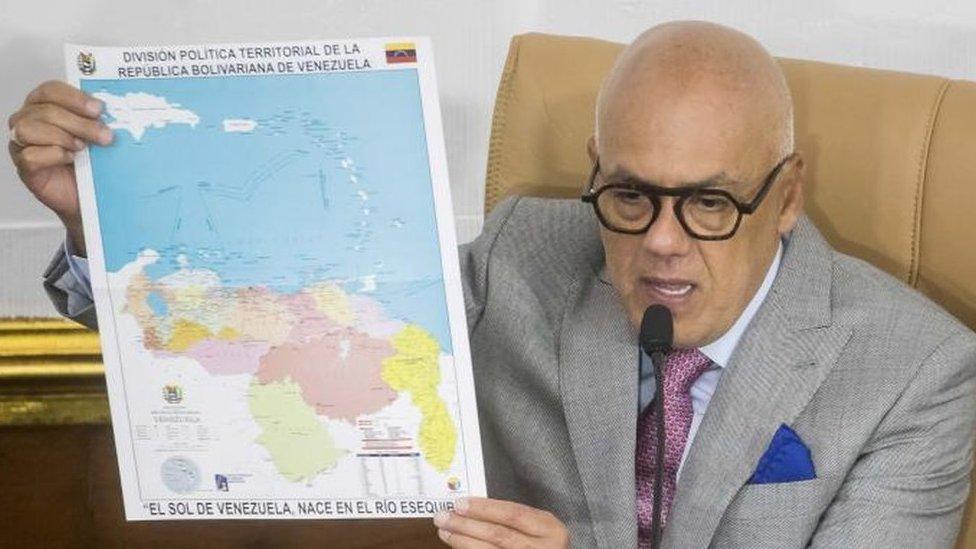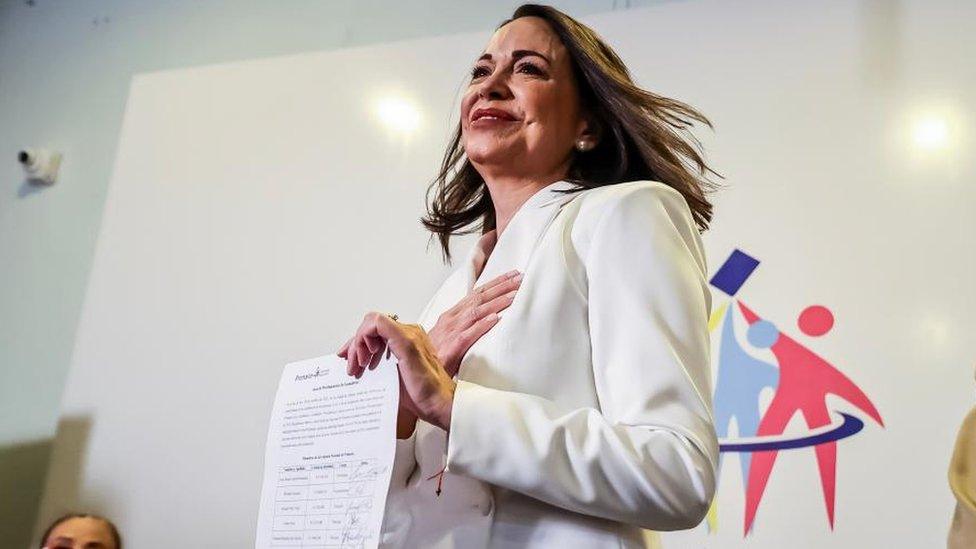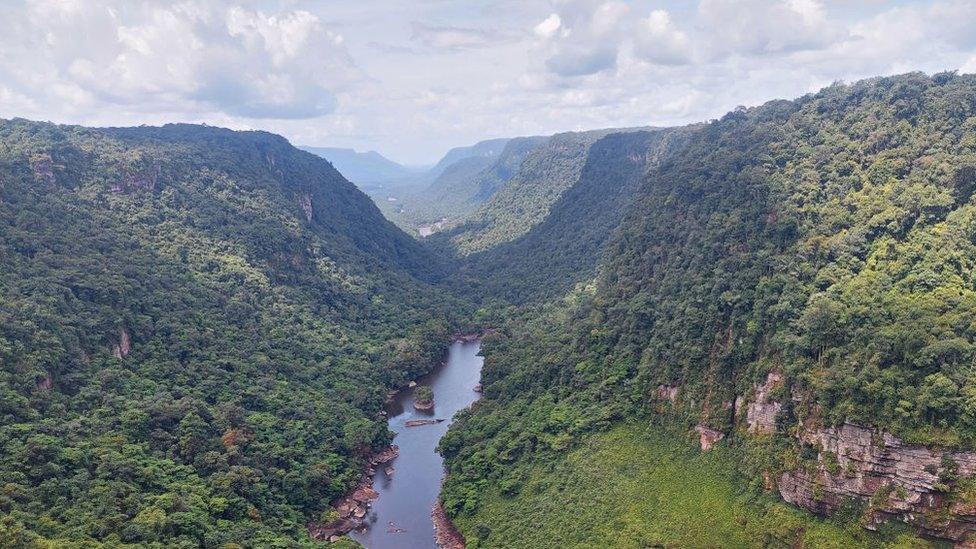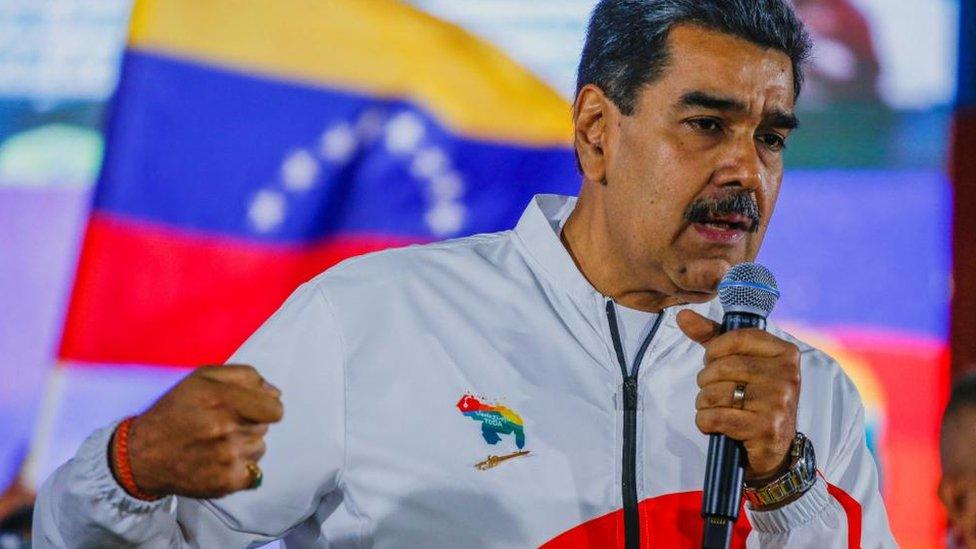Venezuela accuses opposition politicians of treason over Essequibo
- Published

The government held a referendum about the status of the Essequibo last Sunday
Venezuela has ordered the arrest of several politicians with close links to opposition presidential candidate María Corina Machado.
Attorney-General Tarek William Saab accused them of trying to sabotage last week's referendum over Venezuela's claim to the disputed Essequibo region.
An overwhelming majority of those who voted backed the government's position on Essequibo.
But government critics have raised questions about the turnout.
Many analysts have described the Essequibo referendum as a tactical response by President Nicolás Maduro to whip up nationalist fervour and distract from the calls for free and fair elections.
The referendum has not only ratcheted up tensions between Venezuela and its neighbour Guyana, which has controlled the disputed area for more than a century, but also between the government and its critics.
Mr Saab, an ally of President Maduro, announced that he had issued arrest warrants for 14 people with links to the opposition.
He said in a televised announcement that the prosecutor's office had uncovered a "transnational conspiracy" allegedly financed by US oil giant Exxon Mobile to undermine Venezuela's claim to the Essequibo region.
Essequibo is an oil-rich swathe of jungle administered by Venezuela's neighbour, Guyana.
The 159,500-sq-km (61,600-square-mile) region makes up two-thirds of the total of the land currently controlled by Guyana. It is home to 125,000 of Guyana's 800,000 citizens.
Venezuela has long claimed that a 1899 decision made by an international tribunal, awarding the area to what was then known as British Guiana, was unfair.

Guyana has taken the matter to the International Court of Justice in The Hague, but Venezuela has not accepted that the ICJ has jurisdiction.
In the referendum it held last Sunday, the government asked five questions, including whether Venezuelans agreed with the government's position to reject that the ICJ has jurisdiction.
The electoral authorities announced that more than 95% of voters supported the government's position on the matter, as well as President Maduro's plan to create a Venezuelan state in the disputed area.
The head of the National Electoral Council (CNE), Elvis Amoroso, also said that 10.4 million Venezuelans had turned out to vote - more than 50% of eligible voters.
But government critics have cast doubt on the figure, saying that polling stations appeared very quiet for such a large turnout.
Analysts say the attorney-general, who is an ally of President Maduro, is turning on those who have described the referendum as anything but a resounding success for the government.
Among those for whom arrest warrants have been issued are three members of the team of María Corina Machado, who was recently chosen as the opposition's unity candidate in next year's presidential election.

María Corina Machado won the opposition's primary by a landslide
Furthermore, warrants have been issued for key opposition politicians who are living in exile, including Juan Guaidó, Julio Borges, David Smolanski, Carlos Vecchio and Leopoldo López.
Mr Saab accused the 14 of "involvement in a conspiracy to sabotage the Venezuelan people's fight for Essequibo", which he said they had financed with money "laundered by international organisations and foreign companies like Exxon Mobil".
Exxon Mobil, which was granted oil exploration licences by Guyana in Essequibo's offshore waters, has not yet responded to Mr Saab's comments.
Venezuela's moves are being watched with concern by countries in the Western Hemisphere.
Brazil has said that it is deploying troops to its border with Venezuela, while a US National Security Council spokesman described the situation as "concerning".
"We're watching this very, very, very closely," said the spokesman, John Kirby.
Related topics
- Published7 December 2023

- Published4 December 2023
